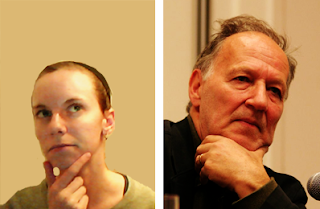
Man guys, I have to be balls-to-the-wall honest: I have a hard time understanding Beuys. A large part of it, I think, was due to my 3 second attention span--while watching his documentary I would continually get distracted by the 80s era special effects (as well as the random subtitles) and after listening to him for an hour, I could honestly not remember a single thing he had said.
“Only art is capable of dismantling the repressive effects of a senile social system that continues to totter along the deathline: to dismantle in order to build ‘A SOCIAL ORGANISM AS A WORK OF ART’… EVERY HUMAN BEING IS AN ARTIST who – from his state of freedom – the position of freedom that he experiences at first-hand – learns to determine the other positions of the TOTAL ART WORK OF THE FUTURE SOCIAL ORDER.” --from Caroline Tisdall: Art into Society, Society into Art (ICA, London, 1974), p.48Ahh, but this! This I understand. I like that for all his strangeness, at the core Beuys seemed truly interested in promoting social change through a green initiative--that all of his work was used to finance buying trees, even making weird random Japanese whiskey commercials. (By the way, getting American celebrities to do commercials is crazy popular in Japan.) And while his work may be difficult for me to unpack, it seems like it was deeply important to him, and that he carefully and thoughtfully created his pieces. I can respect that. I can also respect that even though he completely fits the stereotype of a weird, nonsensical, elitist modern artist, he also truly believed in everyone's ability to create. Plus he seems like such a genuinely nice guy! Like he would be fun to walk around with and talk about birds or something. Approachable--I think that's the word I'm looking for.
Connecting Beuy's work to my own...hmmm slightly more difficult. Maybe because I don't feel like I have an excellent grasp on his ideas it's harder to find connections between us? I think we develop our art making in different ways, certainly in different media. In my own way I am making a sort of personal mythology, though with digital images rather than felt and tallow. I think he would appreciate photoshopping as a sort of art, however!


